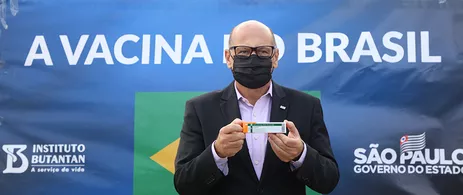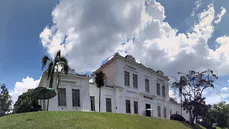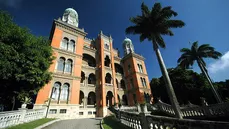
Vaccines and their production have been of great importance for public health not only since the Covid-19 pandemic. Brazil struggles with a large number of (tropical) diseases due to its tropical climate, among other factors, which necessitate local vaccine development and production. Liaison Officer Sören Metz shows how well positioned Latin America's largest country is in terms of vaccine research.

Brazil maintains two public research institutions, the Butantan Institute and the Oswaldo Cruz Foundation (Fiocruz), which are world-class especially in vaccine development and manufacturing.
The Butantan Institute was founded at the beginning of the 20th century by the State of São Paulo in order to stop the bubonic plague that was then rampant in the port of Santos. The institution became famous with its research in the field of snake venoms, and there are still a reptilium and a monkey house on the premises of the institute.
Well supplied thanks to Butantan Institute and Fiocruz
Annually, some 300,000 people visit the institute and the park-like facility, which is directly adjacent to the capital campus of the University of São Paulo. The institute has a production capacity of more than 200 million vaccine doses per year and is now the most important producer of influenza vaccines in the Southern Hemisphere and the largest vaccine producer in Latin America. It plans to produce 180 million vaccine doses in 2021 – 100 million CoronoVac vaccine doses and 80 million influenza vaccine doses.
The Oswaldo Cruz Foundation (Portuguese: Fundação Oswaldo Cruz, also known as Fiocruz) is a scientific institution for research and development in the biological sciences based in Rio de Janeiro. It is considered one of the world's most important public health research institutions and, like the Butantan Institute, is also a vaccine manufacturer. In addition, Fiocruz is a medical university that offers 32 academic programs in health and medicine.
Free healthcare in Brazil
The National Immunization Program (Portuguese: PNI) is funded through the SUS (Sistema Único de Saúde) public unified health system. Since its creation in 1973, the program has become one of the country's most important public health interventions and has achieved important results. These include the certification of Brazil as free of wild poliovirus circulation, the elimination of rubella virus circulation, and an overall significant reduction in cases and deaths from vaccine-preventable diseases over the past four decades. In the PNI, vaccination rates of one million people per day are possible.
In this context, Brazil is also among the countries that provide most of the vaccines free of charge to their population.

Vaccines against Covid-19
Fiocruz and Instituto Butantan are also responsible for the local production of the vaccines for Covid-19.
Instituto Butantan cooperates with the Chinese manufacturer Sinovac. It is still producing the vaccine known as CoronaVac with the active vaccine from China – full local production is expected in the second half of 2021.
Fiocruz manufactures the Oxford-AstraZeneca vaccine at its facilities in Rio de Janeiro – again, the active vaccine still comes from India, with fully local production also planned for the second half of 2021.
TUM Center for Global Health
TUM is very active in the field of global health with its School of Medicine and has been operating the Center for Global Health for four years, which also cooperates with institutions in Latin America – specifically in Mexico, Brazil, and Peru. If you are interested in collaborating with TUM in this area, please feel free to contact the TUM São Paulo liaison office for Latin America.